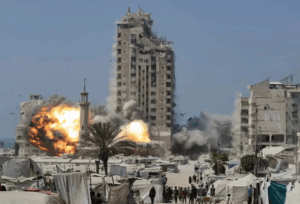Introduction
In a shocking statement, Russian President Vladimir Putin declared that any Western soldiers entering Ukraine will be considered legitimate military targets by Russian forces. This remark significantly escalates the ongoing conflict in the region, as tensions between Russia and NATO allies continue to grow. The statement underlines Russia’s firm stance on foreign involvement in the war and signals potential new threats to Western military personnel.
As the war in Ukraine enters its second year, Russia has repeatedly warned the West against direct intervention, but this latest statement from Putin seems to be a clear declaration of intent: the presence of foreign troops on Ukrainian soil would not be tolerated. This article explores Putin’s comments, their potential ramifications for international relations, and how the West might respond to such a provocative declaration.
Putin’s Warning: A Major Shift in Russia’s Stance
President Putin’s remarks came during a televised meeting with military officials. He emphasized that the presence of any NATO or Western soldiers in Ukraine would mark an escalation in the conflict, making them fair game for Russian forces.
The Kremlin has long maintained that the involvement of Western nations, whether through arms shipments or military advisers, constitutes an act of aggression. But Putin’s statement goes a step further, designating Western military personnel as “legitimate targets” if they were to step onto Ukrainian soil.
This declaration is not just about rhetoric—it’s a warning of the potential for direct military confrontation between Russian forces and NATO soldiers, something that many fear could rapidly spiral into a larger, more dangerous conflict.
Also read : Xi Jinping Likely to Skip Trump’s Inauguration
The Potential Consequences of Direct Confrontation
Should Putin’s warning translate into action, the consequences could be severe. NATO, which has been providing significant support to Ukraine in the form of weapons, training, and intelligence, has already condemned Russia’s military aggression. However, NATO troops have so far avoided direct involvement in the fighting.
A direct confrontation between NATO soldiers and Russian forces in Ukraine would represent a significant escalation in the war. It could trigger Article 5 of the NATO treaty, which considers an attack on one member state as an attack on all. Such a move would immediately involve other nations in a military conflict, including the U.S., the UK, and European countries.
This situation would not only escalate the war in Ukraine but could also lead to global instability, drawing in countries that have so far remained neutral in the conflict.
Russia’s Military Strategy: A Clear Message to the West
Putin’s statement can also be seen as part of a broader strategy to deter Western nations from increasing their support to Ukraine. By labeling Western soldiers as legitimate targets, Russia is sending a message to NATO allies, hoping to prevent further escalation and discourage any future ground troop deployments.
The rhetoric underscores Russia’s growing impatience and frustration with the West. As the conflict drags on, Moscow has shown little willingness to negotiate, with Putin insisting that Ukraine must be demilitarized and “denazified” as a condition for peace. At the same time, Russia has ramped up its military offensives, increasing the stakes of a prolonged war.
The West’s Response: Diplomatic or Military?
In response to Putin’s warning, Western leaders have reiterated their support for Ukraine, emphasizing the importance of continued assistance in the form of military aid, economic sanctions on Russia, and diplomatic pressure. However, NATO has been cautious in avoiding direct military involvement, wary of triggering a wider war.
U.S. President Joe Biden, along with European leaders, has made it clear that NATO’s primary role is to aid Ukraine without engaging directly in the fighting. However, this position is becoming more difficult to maintain as Russia continues its aggressive actions.
Western nations are likely to continue their strategy of providing support from a distance, but the possibility of a direct confrontation remains a real concern. How the West handles this growing tension will shape the future of the conflict and the international order in the years to come.
The Global Implications of Putin’s Statement
Putin’s remarks could have far-reaching implications for international relations.
Conclusion: A Dangerous Crossroads
Putin’s statement marks a dangerous crossroads in the Ukraine conflict.
As the conflict continues to unfold, both sides will need to carefully consider their next moves. Diplomacy may still offer a path to de-escalation, but with each provocative statement, the risk of an all-out confrontation grows.
Also read : Xi Jinping Likely to Skip Trump’s Inauguration
More Stories
Israel Orders Full Evacuation of Gaza City Ahead of Major Attack
The Israeli military has officially ordered the evacuation of the entire Gaza City in preparation for a large-scale military assault....
Spain to Ban Israeli Cargo Ships and Planes from Entering Its Territory
In a major shift in international relations, Spain has announced that it will be blocking Israeli cargo ships and planes...
📰 Escalating Violence: Israel Airstrikes Destroy High-Rise Buildings in Gaza City
▶ Brutal Strikes Target Civilian Infrastructure According to local sources and international media, Israeli fighter jets launched a series of...
📰 SUI Token Price Fails to Rise Despite Speculation
In recent weeks, the crypto market was abuzz with speculation that the SUI token price could surge significantly. Many traders...
Coinbase Executive Warns Bitcoin Could Explode Like the South Sea Bubble
In a striking statement that has stirred debate across the crypto industry, a senior executive at Coinbase Asset Management has...
Gemini Crypto Firm Aims for $2.3 Billion Valuation with IPO Plans
Gemini, one of the leading cryptocurrency exchanges, is setting its sights on a massive $2.3 billion valuation as it prepares...

